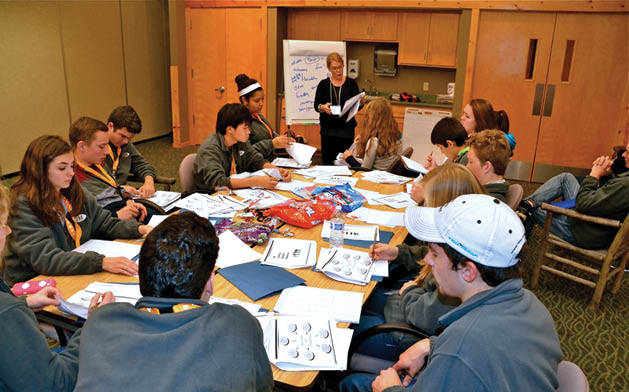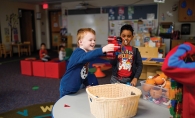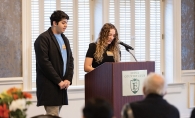Ah, camp retreats. There’s nothing better than spending a few days in a cabin, enjoying the outdoors and bonding with friends. Who doesn’t have a story to tell about summer camps, class trips or church outings? This rite of passage is so quintessentially Americana.
At Camp Enterprise, high school students enjoy a less common weekend excursion. Instead of frolicking through the woods and exploring nature, they spend the weekend meeting with business leaders and creating their own business plans. The students then pitch their business plans to the business leaders, and the best of the best leave the weekend with $1,000 college scholarships.
“The goal is to provide students with a range of experiences so they can envision themselves in business roles and learn more about the free enterprise system,” Jody Kern says. Kern is an event organizer who works behind the scenes.
Running November 6-8 at YMCA Camp Ihduhapi on Lake Independence, this annual event is sponsored by the Rotary clubs of Edina and Rotary District 5950. Each year, around 100 students from across Minnesota and Wisconsin, with about as many volunteers, come together for a weekend focused on business, leadership and entrepreneurship.
Katie Hoglin is heading into her senior year at Edina High School. She attended Camp Enterprise last fall. “It was definitely eye-opening,” Katie says. “It was a completely new experience for me because I have never really done business work in school.”
When students first arrive at camp, they are divided into business teams of six or seven participants. From there, they take part in team-building exercises to get to know each other so they can choose their roles within each business (CEO, CFO, HR, marketing, etc.). Each business team is supplied with a case study. Teams must create a business plan to solve the problem presented in the study. Three or four teams are given the same issue and compete against each other to develop the best solution.

Students work with mentors, listen to speakers and work together to create their business plan. This all leads up to a group presentation. They also meet one-on-one with a mentor who matches their assigned role. For example, Katie was the CFO of her team, so she worked with a real CFO on honing her skills.
Katie’s team was tasked with solving the perils of poor traction while driving in winter. Her group came up with an idea for a treatment that would soften the surface of tires to create more traction on snow and ice, a plan they shaped over two and a half days.
Kip Peterson worked at Camp Enterprise for the first time last year and will chair the event next year. “It was remarkable how much the students got done in a relatively short amount of time,” Peterson says. “They have 12 or 15 hours to put together a business plan and make a pitch to their venture capitalists. It was pretty remarkable how quickly they came together and how effectively they were able to work together. They came up with very detailed and well thought out proposals.”
Putting on an event of such magnitude and cramming it into one weekend requires a large group of volunteers. Each year, a chairperson is elected from one of the participating rotary clubs. This year’s chair, Tom Gump, says being the chairperson is one of the easier jobs because there are so many people available to help (about 150 volunteers this year). “I rely a lot on the others,” he says.
Although the core of Camp Enterprise remains mostly unchanged, organizers look for places to improve the program. Noticing many kids are registering and searching out the event on mobile devices, the focus this year has been to completely overhaul the Camp Enterprise website and make it more mobile-friendly.
In many ways, the weekend itself is the easy part. With so many people dividing up tasks, and students busy and engaged, none of the organizers have had any major problems arise, and the students truly love being there.
“Working together, [students] start to become more creative, and really start to work as a team as time goes on,” Katie says. “You start off with nothing and gradually build into this huge box of ideas. It was really amazing to see that six people could come up with ideas and present them in front of these investors to win them over.”

By the end of the weekend, students have a whole new experience under their belt. Winning teams are selected, and although the teams don’t win any specific prize, bragging rights are more than enough. Katie’s team was among those selected last year. “It’s a pretty big deal,” she says.
On the last day, every attendee writes an essay about which speaker or mentor impacted him or her most. A group of judges consider the essays, and in conjunction with other factors, four students are each awarded a $1,000 college scholarship. Katie was one of this past year’s recipients, although it is the last thing she mentions.
The weekend is about team-building and learning new skills. The scholarship is a bonus for those who receive one, but for everyone involved, the weekend is about learning new things and bonding with new people. And that goes for the students and volunteers alike.
Additional photos courtesy of John Flynn









